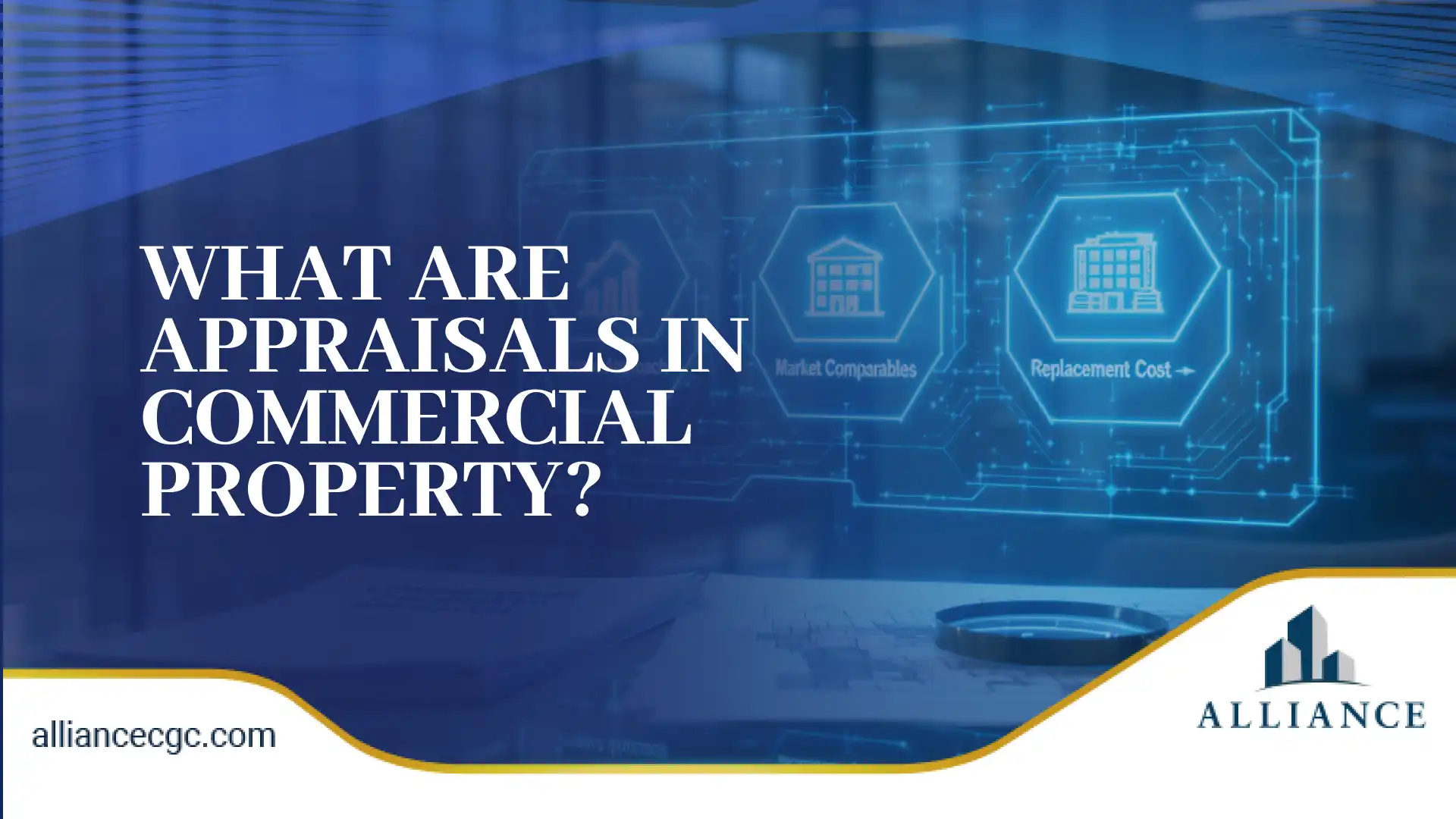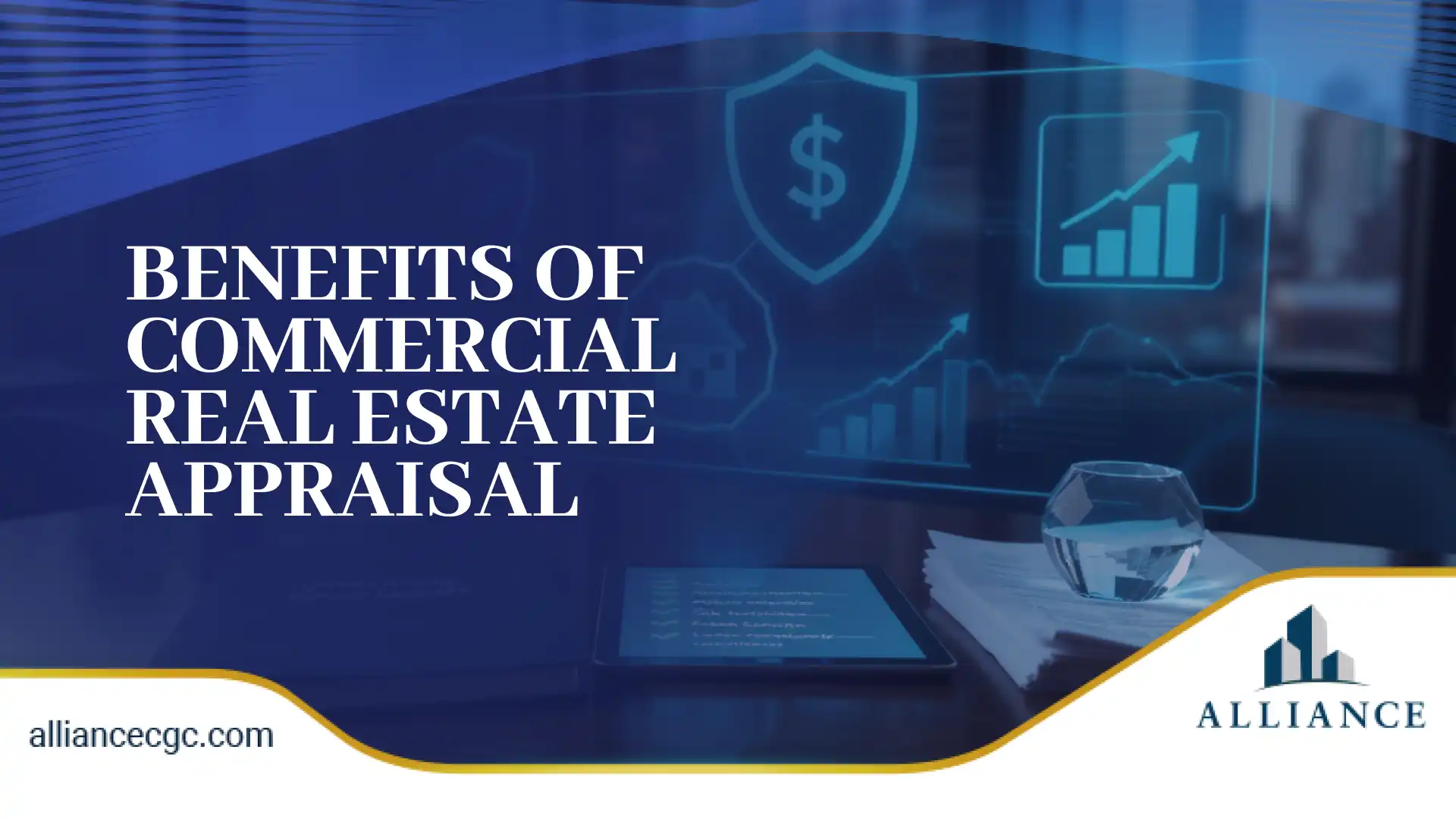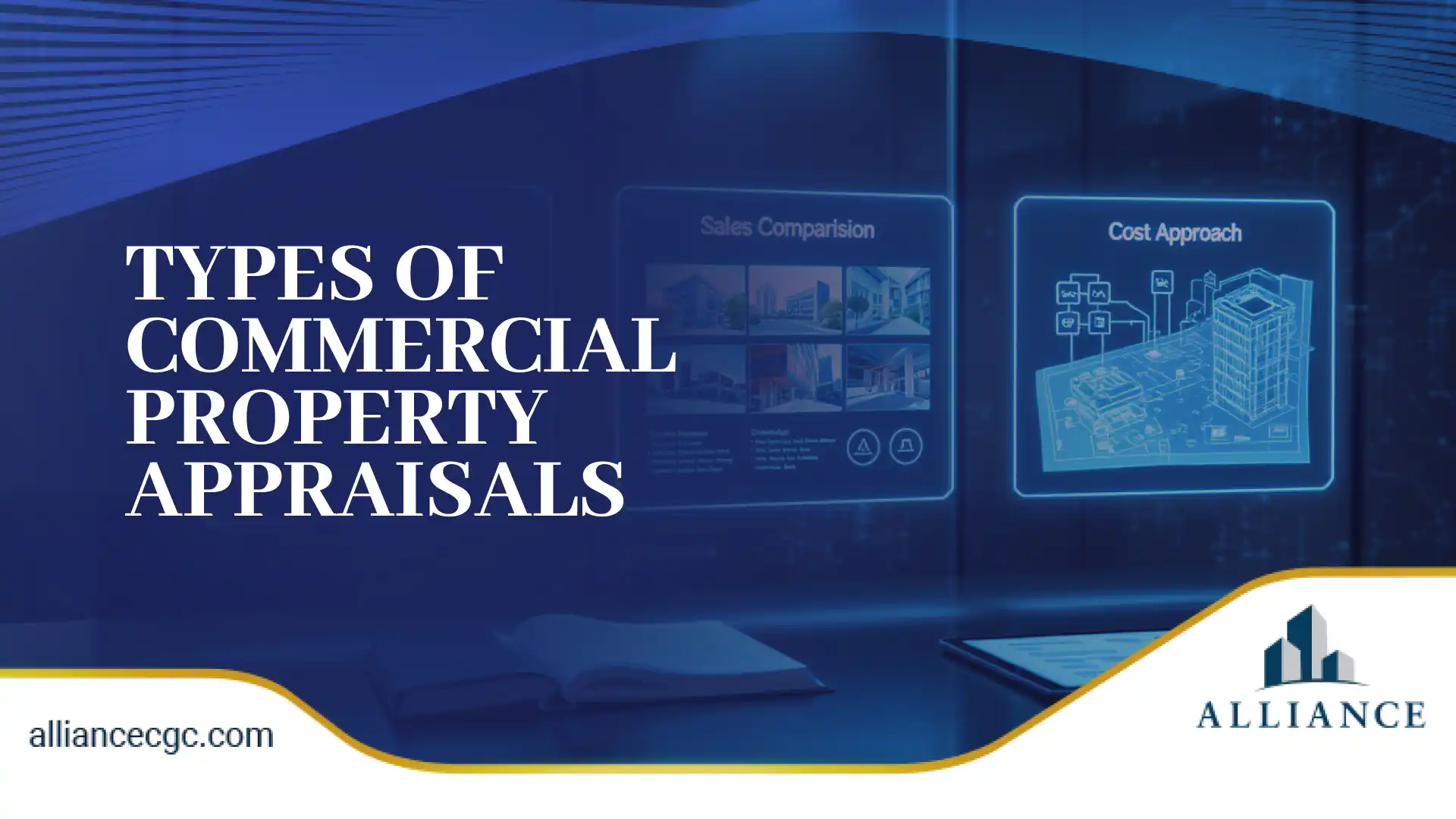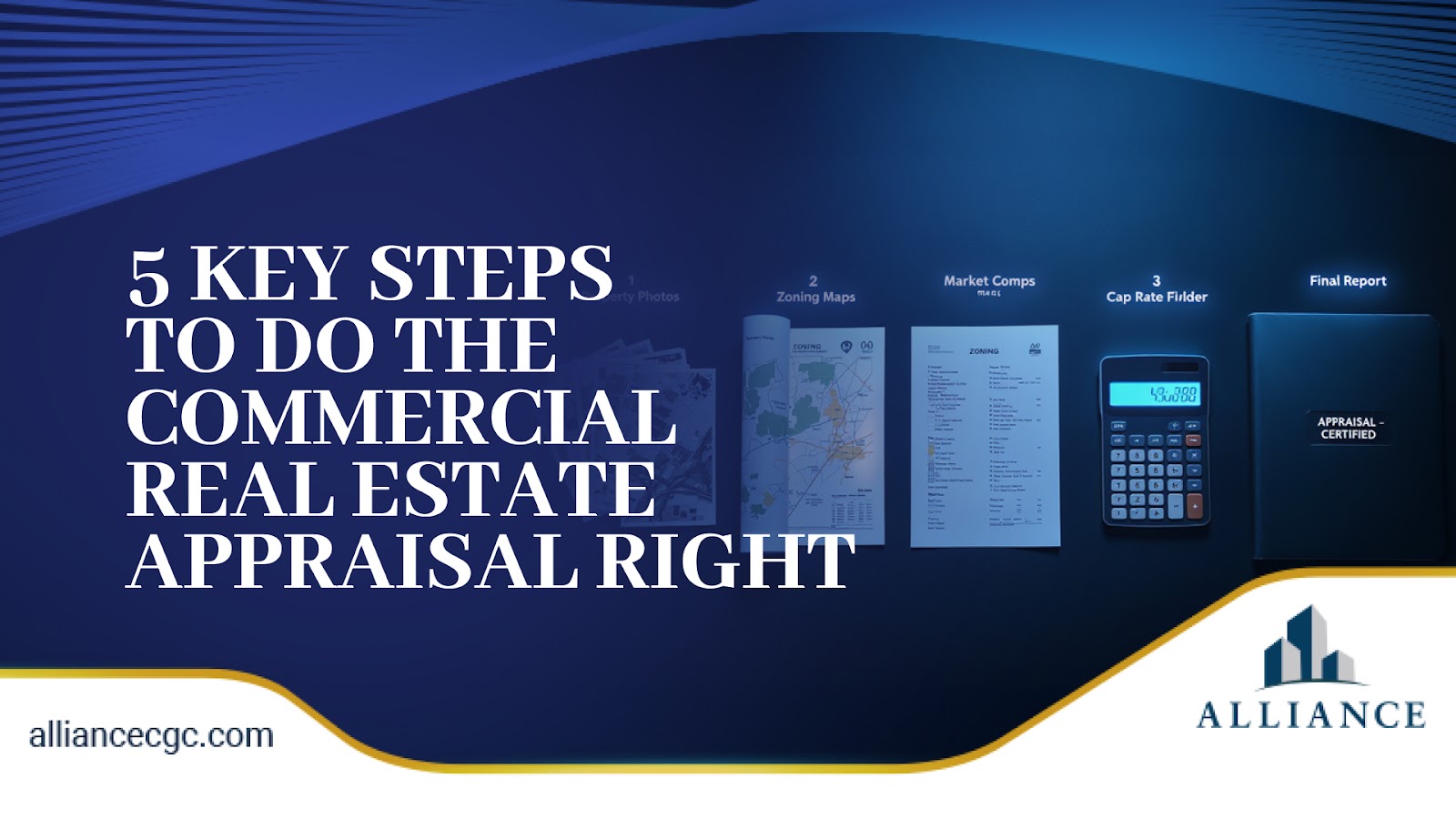Strategic Insights Into Commercial Real Estate Appraisals
July 14, 2025

Misjudging the value of a commercial property can cost you millions or sink your investment before it even starts. According to the National Association of Realtors, valuation issues, such as appraisal delays and a lack of comparable properties, are increasingly affecting commercial real estate (CRE) transactions.
Backed by billions in assets purchased and a 28% historical internal rate of return (IRR), Alliance CGC knows that accurate appraisals are the cornerstone of smart real estate strategy, not just paperwork for a loan. With decades of hands-on experience, Alliance understands the real-world stakes of underestimating a property’s value.
Guessing the value of CRE is a gamble that can hurt your finances and confidence. You may have a number in mind but, without a proper appraisal, it's easy to overlook key details that can significantly impact the outcome.
Market shifts, buildings' age and even a great location do not guarantee tomorrow's same return. Clarity isn’t optional. A proper appraisal is nonnegotiable if you want to build wealth in CRE. So, how do you determine the value of your commercial property before taking action?
What Are Appraisals in Commercial Property?

A commercial real estate appraisal refers to a detailed evaluation conducted by a licensed appraiser to determine the fair market value of a commercial property. This process helps buyers, sellers, lenders and investors make informed decisions based on objective property data.
Property types assessed can include office buildings, warehouses, multifamily units, retail space and undeveloped land. The appraisal of these properties typically includes
- Physical inspection
- Financial performance analysis
- Comparisons to similar property sales in the area
Lenders often require an appraisal before approving financing to ensure the property can support the loan amount. Meanwhile, sellers and buyers use the valuation to negotiate with confidence, avoiding overpaying or underselling.
Benefits of Commercial Real Estate Appraisal

Getting a commercial real estate appraisal can save you from costly mistakes if you're about to invest in or sell a commercial space. You might not always know the actual commercial property value, especially when markets shift, but that’s where an expert steps in.
Studies show that the average absolute difference between appraised values and actual sales prices in CRE is approximately 12%, underscoring the importance of expert appraisals in avoiding costly misjudgments.
Professional commercial property appraisers give you a clearer picture and help you move forward with less stress. You’ll immediately see the difference in how decisions feel easier and less risky:
- Accurate pricing: You avoid overpaying or underselling by knowing the property's true value.
- Trusted insights: Lenders, investors and buyers take your deal more seriously when a formal commercial real estate valuation supports it.
- Financial clarity: You’ll feel more secure making big decisions with verified numbers in hand.
- Negotiation power: It’s easier to use real estate valuation strategies and defend your asking price when you’ve got facts to support it.
With an accurate commercial real estate appraisal, you’re making confident and informed choices, rather than relying only on guesswork.
Types of Commercial Property Appraisals

Cost Approach
Use the commercial property appraisal cost approach to determine the cost of rebuilding the property from scratch, excluding depreciation. This method works well for newer buildings or unique properties that lack many comparable sales.
You get a clear sense of value based on construction costs, which keeps you from overpaying. It’s beneficial when local sales data is hard to find.
Income Approach
If the property’s earnings drive your investment, focus on the income approach. This method measures the property's net income to estimate its market value.
For example, industrial real estate in the U.S. grew by 1.7% in 2025, showing the increasing income potential of this property investment. The Income approach type of commercial real estate appraisal helps you spot investment-worthy properties with solid long-term potential.
Market Approach
Rely on the market approach when you want to base your decision on recent sales. Appraisers compare your property to similar ones that have been sold nearby to calculate its value. You get peace of mind knowing the price reflects actual market activity. It’s a reliable method for standard commercial buildings in active markets, such as office and industrial properties.
Gross Rent Multiplier Approach
In 2024, Hospitality properties in the U.S. had an average price of $152.24 per square foot. You can use this as your basis if you’re about to choose the gross rent multiplier approach for a quick and early-stage assessment of value.
For a rough estimate, you can divide the sale price by the gross annual rent. This method lets you quickly compare rental properties without delving into detailed expenses. It's great for screening deals before committing to a complete analysis.
Value Per Door Approach
Choose the value per door method if you’re dealing with apartment complexes or multiunit spaces. It assigns a value to each unit and multiplies that by the number of doors. This commercial real estate appraisal approach helps you assess opportunities quickly without overcomplicating things. You’ll appreciate how simple it feels when you're reviewing multiple properties.
Value Per Rentable Square Foot Approach
Use this approach when you want to measure value based on income-producing space. It calculates the value of each rentable square foot based on local market rates. For example, the average U.S. office listing rate in 2025 was $33.34 per square foot while the U.S. in-place industrial rents averaged $8.49 per square foot.
The value per rentable square foot approach gives you a more accurate understanding of how efficiently your building operates. This method works exceptionally well for retail and office properties.
5 Key Steps to Do the Commercial Real Estate Appraisal Right

A well-executed commercial real estate appraisal can make or break your investment strategy. To ensure the appraisal works in your favor, follow these five essential steps.
1. Study the Location and Market Trend
Start by understanding the property's surroundings. Study its accessibility, neighborhood growth, local demand and recent real estate trends. The better the location, the stronger your commercial property valuation will likely be.
2. Inspect the Building’s Condition and Upgrades
A clean, functional and well-maintained building sends the right message to commercial property appraisers. Upgrades, such as energy-efficient systems, modern interiors or structural improvements, can significantly increase commercial property value.
3. Review Occupancy and Lease Agreements
Stable, long-term tenants with strong lease agreements help demonstrate income reliability. Appraisers weigh occupancy rates and lease structures heavily in commercial real estate valuation.
4. Gather Comparable Sales (Comps)
Research and provide recent sales data of similar properties in your area. Strong comps lend credibility and context to your commercial building appraisals, which can support a more favorable valuation.
5. Check Zoning, Environmental Conditions, and Future Use Potential
Understand the zoning laws and environmental status of the property. Properties with development potential or favorable zoning may receive higher commercial building valuations from commercial property value estimators, while restrictions can limit value.
Quick Comparison Table
.webp)
Make Smarter Moves With Expert Property Valuations
Unlocking accurate commercial real estate appraisals is the first step toward making more intelligent and secure investments. However, partnering with an expert who understands how to manage the complexities of CRE investing ensures those real estate valuation methods truly work in your favor.
With over $500M in assets under management and a historical 28% IRR, Alliance CGC's approach is built for long-term and resilient growth. We ensure every appraisal supports your financial goals. With over 30 years of data-backed investing experience, we transform complex appraisals into confident decisions.
Partner with us today. Maximize your asset’s value before someone else does.
Frequently Asked Questions (FAQs)
How do you appraise a commercial property?
A commercial property is appraised by analyzing income potential, market comparables and replacement costs. A licensed appraiser inspects the property, gathers data and applies one or more standard valuation methods to determine fair market value.
How much does a commercial property appraisal cost?
A commercial property appraisal typically costs $2,000 to $10,000, depending on the property’s size, complexity, location and the scope of the report.
How do you assess the value of a commercial building?
Appraisers use three methods:
- Income approach (based on rental income)
- Sales comparison (recent sales of similar properties)
- Cost approach (cost to rebuild minus depreciation)
What are the three types of appraisals?
The three primary appraisal methods are:
- Income approach
- Sales comparison approach
- Cost approach
Each is used based on the property type and available data.










